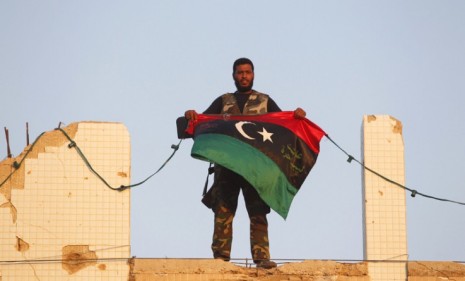4 obstacles Libya's new leaders must overcome
Yes, the rebels have taken much of Tripoli. Yes, it looks like curtains for Moammar Gadhafi. But Libya's biggest challenges still lie ahead

A free daily email with the biggest news stories of the day – and the best features from TheWeek.com
You are now subscribed
Your newsletter sign-up was successful
Libya's rebels have raised their flag in Moammar Gadhafi's Tripoli compound, symbolically declaring victory over their longtime ruler. Though not all of the country is under rebel control and even though Gadhafi has eluded capture and vows to keep fighting, the National Transitional Council (NTC) said on Wednesday that it's moving key ministries from Benghazi to Tripoli. However, as we all learned from Iraq, says Fred Kaplan at Slate, "'regime change' marks only the beginning of the story, not the end." Here, four potential hazards the NTC must avoid to keep Libya from descending into chaos:
1. Looting and lawlessness
Libya's new government must "impose law and order immediately," says Kaplan, even if that requires a curfew, or a short period of martial law. "If the U.S.-led authorities had shot a few looters in the first days after Saddam Hussein fled Baghdad," Iraq would have been spared a lot of grief. In Libya, "the sheer amount of weaponry strewn around the country will probably pose the greatest challenge," says Christopher Hill at CNN. In the short term, the rebel factions have to be disbanded, and either sent home or integrated into the quickly retrained police force.
The Week
Escape your echo chamber. Get the facts behind the news, plus analysis from multiple perspectives.

Sign up for The Week's Free Newsletters
From our morning news briefing to a weekly Good News Newsletter, get the best of The Week delivered directly to your inbox.
From our morning news briefing to a weekly Good News Newsletter, get the best of The Week delivered directly to your inbox.
2. A rash dismantling of Gadhafi's regime
Gadhafi was eccentric, but he designed his government along fairly "normal" lines, says Brian Whitaker in Britain's Guardian. The worst thing the NTC can do is "dismantle it at a stroke and then start again from scratch." The NTC needs to find a "very delicate tradeoff," says Joshua Tucker at The New Republic, between punishing Gadhafi enablers to meet Libyans' legitimate demands for justice and "incorporating at least some members of the 'Old Regime'" who both know how to run Libya and have an incentive to support the new regime.
3. Demoralizing water, power, and food shortages
"Restoring public order will be job one," says Daniel Serwer at The Atlantic, but close behind is "restoring electricity, food, and water." Basic services are crucial to creating "a functioning government," says Richard Haass in Britain's Financial Times. Libya is lucky that it has oil wealth to pay for that, says The New York Times in an editorial, but "decision-making — including how to restart damaged oil wells and share oil revenues — must be transparent."
A free daily email with the biggest news stories of the day – and the best features from TheWeek.com
4. A new war between rebel factions
The so-called "Libyan rebels" are not a single entity. Factions within the diverse anti-Gadhafi forces share just two common traits, says STRATFOR analyst Bayless Parsley, quoted by CBC News: "One, they're referred to collectively as Libyan rebels, and two, they all shared a common desire to oust Gadhafi." If they don't find a mutually satisfactory way to share power, civil war is "a very real possibility." Especially since some of the factions and tribes "hate one another," says Slate's Kaplan. If they haven't "already settled on some formula" to get along, things "may get very messy."
-
 6 exquisite homes with vast acreage
6 exquisite homes with vast acreageFeature Featuring an off-the-grid contemporary home in New Mexico and lakefront farmhouse in Massachusetts
-
 Film reviews: ‘Wuthering Heights,’ ‘Good Luck, Have Fun, Don’t Die,’ and ‘Sirat’
Film reviews: ‘Wuthering Heights,’ ‘Good Luck, Have Fun, Don’t Die,’ and ‘Sirat’Feature An inconvenient love torments a would-be couple, a gonzo time traveler seeks to save humanity from AI, and a father’s desperate search goes deeply sideways
-
 Political cartoons for February 16
Political cartoons for February 16Cartoons Monday’s political cartoons include President's Day, a valentine from the Epstein files, and more